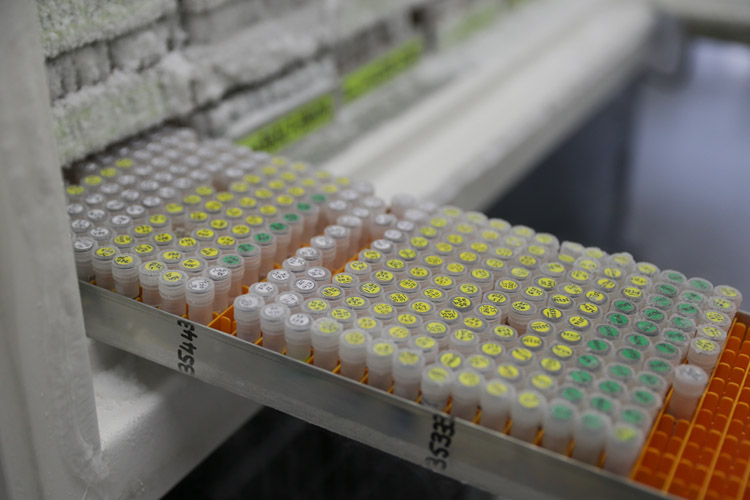Last summer, Karen, an Ontario woman, was eight months pregnant and trying to tie up loose ends before her baby arrived. First on the list was insurance.

“We realized we’re going to have two children in day care, and that’s going to be $30,000 in day care costs, so we decided we needed more life insurance.”
The other was a genetic question — Karen’s mother, who had cancer three times, turned out to have the BRCA1 genetic mutation that can mean a much higher risk of breast and ovarian cancer.
Karen, whose father died of cancer, wanted to know if she’d inherited it. She did.
But before she got the results back, she made the mistake of mentioning the test to the insurance broker, at which point, she says, the application process stopped dead.
“He goes and checks with the insurance company what the protocol is, and of course they come back and say ‘No, no, it’s not in force until the policy is in your hands,’ so what we would do is reopen the underwriting process and wait for the results of this test. So you’re not approved any more.”
(Karen didn’t want to be fully identified for medical privacy reasons: “I don’t really want to disclose my genetic information to the world,” she explains.)
In the end, Karen withdrew her application in order not to have a denial on her record. Despite having two small children, she’s doing without life insurance and hoping for the best.
“It’s scary. God forbid, if something did happen to me in spite of the steps I take, my husband’s not going to be in a very good position.”
WATCH: Ovarian cancer is the most fatal of all women’s cancers – but genetic testing can help women take steps to protect themselves.

As they become cheaper and more sophisticated, genetic tests are playing a prominent part in health care. But people trying to learn about their health situations aren’t the only ones interested in what they show. Insurance companies — whose bottom line depends on accurately calculating risk — are eager to add another dimension to what they know about their policyholders.
READ MORE: Liberal MP Rob Oliphant announces bill to prevent genetic discrimination
The result, depending on what side you’re listening to, is either genetic discrimination or just part of a good-faith agreement where neither side is hiding anything.
A bill winding its way through Parliament would ban insurance companies from requiring customers to disclose the results of genetic tests.
“I felt that nothing is more private than your own genetic makeup,” explains Sen. James Cowan, who sponsored the bill.
“Under our laws, at the present time, if you’re an insurer, and I want to be insured by you, then you are entitled to ask me whether I’ve ever taken a genetic test of any kind, and if so to disclose it. If you say no, and then they find out that you have, then they could argue that you lied, and then the policy is void.”
Insurers don’t see it that way.
“We’re concerned that people who know they are going to be at higher risk of getting a particular condition seek out insurance, and actually seek out larger policies than they otherwise would have,” says Stephen Frank of the Canadian Life and Health Insurance Association.
“Individuals who test negative would potentially seek less coverage than they would have, and the pooling aspect of insurance starts to get undermined.”
If Cowan’s bill passes, Frank predicts that premiums will rise, making insurance less affordable.
The bill passed third reading in the Senate in April, and went through first reading in the House of Commons in May. Parliament returns from summer break in late September, after which the bill has a chance of becoming law.
Before the 2015 election, a previous version of the bill languished in the Senate for years, but faltered under Conservative opposition.
WATCH: A Toronto woman was denied critical illness insurance that would help cover her mortgage if she were to get sick, because of her family medical history.
Karen, and Cowan, point to a perverse effect — by creating a reason to avoid genetic testing for medical issues, insurers make it more likely that policyholders will be less healthy, fall victim to health problems that they might have handled better with more information, and die young. But armed with the test results, they become a better risk for insurers.
“That’s the irony,” Karen says. ”I could have not had the test, and blithely gone about my life, carelessly skipped breast self-exams, and had an extra glass of wine more often. Now, knowing this information, I’m going to be a lot more proactive in managing my health, and hopefully I’ll be all right.”
“Knowing this information, I’m at a lower risk of death. I qualify now for enhanced screening, annual MRI, annual mammogram. I might just go the Angelina Jolie route and have everything removed to reduce my risk.”
Frank argues that nothing in the existing system should discourage people from genetic testing, since people don’t have to go back and tell insurers about tests they have after they buy the policy:
“I don’t think we are discouraging people from getting genetic tests. If people want to get their coverage, they can come in and apply for their insurance, get that in place and go out the next day and get their genetic testing.”




Comments